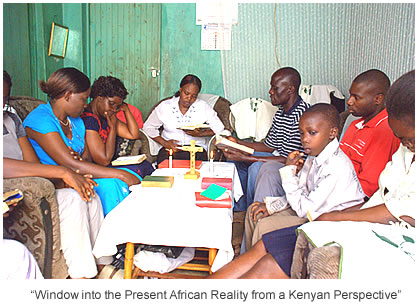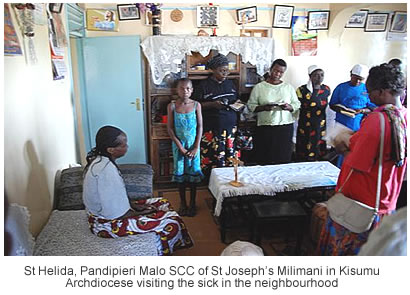Window Into the Present African Reality from a Kenyan Perspective

 Teaching at Hekima College, the Jesuit School of Theology in Nairobi , Kenya has given me a very interesting window into the present African reality. Hekima is a constituent college of the Catholic University of Eastern Africa (CUEA). From January to March, 2008 I facilitated a course on "Small Christian Communities as a New Model of Church in Africa Today." I say "facilitated" rather than "taught" because we tried a new way of teaching and learning to model Small Christian Communities (SCCs) as a new way of being church.
Teaching at Hekima College, the Jesuit School of Theology in Nairobi , Kenya has given me a very interesting window into the present African reality. Hekima is a constituent college of the Catholic University of Eastern Africa (CUEA). From January to March, 2008 I facilitated a course on "Small Christian Communities as a New Model of Church in Africa Today." I say "facilitated" rather than "taught" because we tried a new way of teaching and learning to model Small Christian Communities (SCCs) as a new way of being church.
One new reality is the explosion of African vocations. There were 24 students — all seminarians studying theology – coming from 10 countries. There were 21 first and second year theologians from nine African countries: Angola , Democratic Republic of the Congo (DRC), Kenya , Madagascar , Malawi , Nigeria , Rwanda , Tanzania and Zambia . Three students came from Mexico . The students came from six congregations/societies/orders: Assumptionists, Guadalupe, Jesuits, Montfort, Pallotines and Redemptorists. It is clear that most congregations are now training their African seminarians in Africa itself.
Our course simultaneously took place on three levels: academic, pastoral and personal appropriation. We used the Pastoral Circle or Pastoral Spiral Process — the "see, judge and act" methodology including the tools of social analysis — starting with experience. So we constantly shared and evaluated concrete SCC examples on the local level.
A key to the process is to see that SCCs in Africa are not a program or a project, but a way of life. We sat in a circle to model a typical SCC in Africa . In three different classes we spent 20 minutes each in modeling a typical SCC’s Bible Sharing/Bible Reflection in small groups: once in the whole group, once in groups of six each and once in Buzz Groups of two each. We read and reflected on the Gospel of the following Sunday as thousands of lectionary- based SCCs do every week throughout Africa . Most important we tried to connect the Bible to our daily lives.
 Since SCCs are mainly composed of lay people I invited three lay people (two laywomen and one layman) who are deeply involved in SCCs in Nairobi to help me present SCC case studies and to reflect with the students on their experiences.
Since SCCs are mainly composed of lay people I invited three lay people (two laywomen and one layman) who are deeply involved in SCCs in Nairobi to help me present SCC case studies and to reflect with the students on their experiences.
Another part of the process that we used in this course and in short SCC Workshops in the January to June, 2008 period was to begin with the participants’ practical experience. We asked the basic question: "From your personal experience what are your burning issues, your burning questions about Small Christian Communities?" Then we wrote the most important questions on the blackboard and they become the basis for the facilitators’ input and the group discussion. Some common questions kept coming up again and again:
- How to attract and involve men? Youth?
- What is the difference and relationship between SCCs and the Traditional Parish Associations/Societies/Apostolic Groups/Devotional Groups in the parish?
- How do we help the SCCs to choose and form the best leaders?
- How do SCCs help its members who cannot receive the Eucharist to have church marriages?
- How do we empower SCCs for economic self-reliance and for the financial support of the parish?
- Then in the context of the post December 2007 election crisis and violence in Kenya : Did you/your SCC prevent or promote the violence in Kenya?
Part of the SCC Course at Hekima College was a "Practicum." Instead of a regular class one week, the students participated in a gathering/activity of a SCC in a parish or special interest group/apostolic group in Nairobi Archdiocese and wrote a short paper on the experience. This led to the most dramatic present reality in Kenya . We were surprised, even shocked, to find so much tribalism and ethnicity in SCCs especially in Nairobi where our experiences took place. This permeated and influenced our whole course at Hekima College and all our short SCC Workshops as well. A clear "sign of the times" was that 19 of the 24 final papers were on tribalism and ethnic tensions in SCCs in Africa especially in Kenya today and its ramifications such as Cultural Associations, Nepotism, Human Rights, Gender Issues, Land Reform, etc.
This led to interesting discussions on "SCCs and the Challenges of Reconciliation, Justice, and Peace in Africa Today." We presented many positive and negative examples. The challenge to SCCs that are participating in creating a new Kenya can be summed up in the words of a Catholic woman in a St. Paul Chaplaincy Center, Nairobi Prayer Group: "I am a Christian first, a Kenyan second and a Kikuyu third."
Updated: 27 November, 2009
Father Joseph Healey, M.M. is a Maryknoll missionary priest who is presently teaching a course on "Small Christian Communities as a New Model of Church in Africa Today" at Hekima College (Jesuit School of Theology) in Nairobi, Kenya. He is the co-editor of Small Christian Communities Today: Capturing the New Moment. Maryknoll, NY: Orbis Books, 2005 and Nairobi: Paulines Publications Africa, 2006.
Rev. Joseph Healey, M.M
Maryknoll Society
P.O. Box 43058
00100 Nairobi , Kenya
Tel. 020-4442864
020-4445447
Email: JGHealey@aol.com
